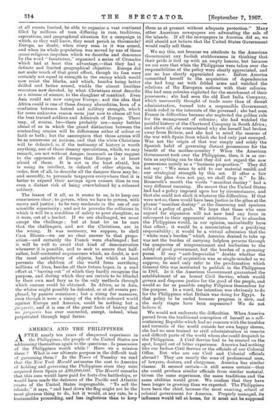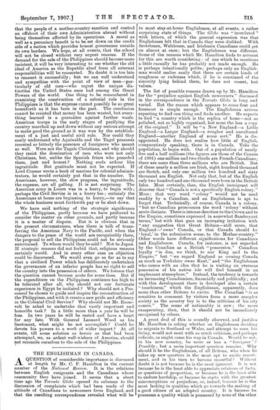AMERICA AND THE PHILIPPINES. A FTER nearly ten years of chequered
experience in the Philippines, the people of the United States are addressing themselves again to the questions : Is possession of the Philippines worth while ? Have we a, mission there ? What is our ultimate purpose in the difficult task of governing them ? In the Times of Tuesday we read that the New York Herald estimates the cost to America of holding and governing the Philippines since they were acquired from Spain at £80,000,000. The Herald remarks that this sum would have paid for forty-five battleships, or would have made the defences of the Pacific and Atlantic coasts of the United States impregnable. "To sell the islands," it says, "and haul down the flag might not be the most glorious thing to do, but it would, at any rate, be a businesslike proceeding, and less inglorious than to keep them as at present without adequate protection." Many other American newspapers are advocating the sale of the islands. If all the newspapers in America did so, we still should not believe that the United States Government would really sell them.
We say this, not because we attribute to the American Government any foolish stubbornness in thinking that their pride is tied up with an empty honour, but because we are sure that when the Philippines were taken over the responsibilities of the policy were clearly appreciated, and are no less clearly appreciated now. Before America committed herself to the acquisition of dependencies she had long sat with folded arms and watched the relations of the European nations with their colonies. She had seen colonies exploited for the enrichment of their possessors ; she had seen the old East India Company, which necessarily thought of trade more than of decent administration, turned into a responsible Government; which ruled in the interests of the governed ; she had seen France in difficulties because she neglected the golden rule for the management of colonies ; she had watched the painful history of the Chartered Company in South Africa; and above all, she remembered why she herself had broken away from Britain, and she had in mind the reasons of the war with Spain from which she had only just emerged. Was not the origin of that war simply and solely the Spanish habit of governing distant possessions for the benefit of the mother-country ? When the American Government took over the Philippines, then, it is as cer- tain as anything can be that they did not regard the new possessions merely as a "business proposition." They did not say : "We mean to add to our material wealth and our strategical strength by this act. If after a, fair. trial the plan does not pay, we shall drop it." In .Mr. Roosevelt's mouth the words "manifest destiny" had a very different meaning. He meant that the United States had had a policy imposed upon her by circumstances, and that she could not shirk it whatever the difficulties. If that were not so, there would have been justice in the gibes at the phrase "manifest destiny" as the disarming and specious title of a policy of grab. We hope that those who once argued for expansion will not now lend any force in retrospect to their opponents' strictures. For to abandon the Philippines would, in our opinion, undoubtedly have that effect ; it would be a renunciation of a purifying responsibility ; it would be a virtual admission that the "white man's burden" which America desired to take up was not the burden of carrying helpless persons through the quagmires of misgovernment and barbarism to the safety of good government, but the burden of a groaning purse. If any " anti-Imperialist " doubts whether the American policy of acquisition was so single-minded as we suppose, he need only refer to the proclamation which General Otis was instructed to publish in the Philippines in 1901. In it the American Government guaranteed the establishment of an honest Civil Service, which would govern and dispense justice for the good of the people, and would so far as possible employ Filipinos themselves for the purpose. In a word, the intention was obviously to do for the Philippines what Britain was doing for Egypt. Is that policy to be ended because progress is slow, and the early stages have been expensive ? We do not believe it.
We would not underrate the difficulties. When America parted from the traditional conception of herself as a self- containing Republic which had no concern with the troubles and turmoils of the world outside her own happy shores, she had no men trained to civil administration in remote and difficult parts of the world whom she could despatch to the Philippines. A Civil Service had to be created on the spot, forged out of bitter experience. America. had nothing like our Indian Civil Service or the officials of our Colonial Office. But who are our Civil and Colonial officials abroad ? They are mostly the sons of professional men, of lawyers, doctors, and clergymen. America has similar classes. It seemed certain—it still seems certain—that she could produce similar officials from similar material. Given the same experience, the same traditions and the same abilities would grow. We confess that they have been longer in growing than we expected. The Philippines have been the chief, because the most exacting, school of colonial government for America. Properly managed, its influence would tell at home, for it must not be supposed that the people of a mother-country sanction and contrcd an offshoot of their own Administration abroad without being themselves affected by its operations. A moral as well as a pecuniary benefit is to be set down on the credit side of a nation which provides honest governance outside its own borders. We hope, at all events, that the school will not be closed without very urgent reasons. If the demand for the sale of the Philippines should become more insistent, it will be very interesting to see whether the old ideal of America as the Republic aloof from all external responsibilities will be reasserted. No doubt it is too late to reassert it successfully ; but we can well understand and sympathise with the point of view of men—par- ticularly of old men—who regret the unique dis- tincti6n the United States once had among the Great Powers of the world. One thing to be remembered in examining the construction of a colonial rule in the Philippines is that the expense cannot possibly be so great henceforth as it has been in the past. The conclusion cannot be resisted that money has been wasted, but every- thing learned is a guarantee against further waste. American troops in the early stages of pacifying the country marched up and down without any serious attempt to make good the ground as it was won by the establish- ment of a just and useful civil rule. Nor could they easily understand why Aguinaldo and the Tagal peasants resented so bitterly the presence of foreigners who meant so well. Were not the Tagals Christians, and why should they resist the domination of men who were not only Christians, but, unlike the Spanish friars who preceded them, just and honest ? Nothing cools ardour like ingratitude. But gratitude must not be expected. If Lord Cromer wrote a book of maxims for colonial adminis- trators, he would certainly put that in the number. To Americans, however, the slow progress, the ingratitude, the expense, are all galling. It is not surprising. The American army in Luzon was in a hurry, to begin with ; perhaps the Civil Service is in a hurry too ; certainly the Americans at home are beginning to hurry,—to say that the whole business must forthwith pay or be shut down.
We have said nothing of the strategic significance of the Philippines, partly because we have preferred to consider the matter on other grounds, and partly because it is a -matter of dispute. But it is obvious that in the present circumstances, when there is talk of trans- ferring the American Navy to the Pacific, and when the dangers to the peace of the world are recognisably there, the proposal to sell the Philippines could not be seriously entertained. To whom would they be sold? Not to Japan. If strategic reasons did not forbid that, religious reasons certainly would. And in every other case an objection could be discovered. We would even go so far as to say that a civilised Power which has deliberately undertaken the governance of an inferior people has no right to sell the country into the possession of others. We foresee that the question cannot become acute for some time. But if the expenditure on the Philippines continues too high to be tolerated after all, why should not our fortunate experience in Egypt be imitated ? Why should not a Pro- consul be chosen to guide and inspire the reconstruction of the Philippines, and with it create a new pride and efficiency in the Colonial Civil Service ? Why should not Mr. Roose- velt be asked to undertake that vastly important and honorific task ? In a little more than a year he will be free. In two years be will be rested and have a heart for any fate. With General Leonard Wood as his lieutenant, what might he not accomplish ? Could he devote his powers to a work of wider import ? At all events, till some solution as heroic as that had been attempted, we, as ardent well-wishers of America, should not reconcile ourselves to the sale of the Philippines.







































 Previous page
Previous page